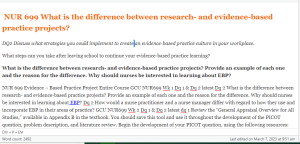DQ2 Discuss what strategies you could implement to create an evidence-based practice culture in your workplace
DQ2 Discuss what strategies you could implement to create an evidence-based practice culture in your workplace
Background: Nurses and midwives are central to the implementation and delivery of quality care through evidence-based practice (EBP). However, implementation of EBP in nursing and midwifery is under-researched with few examples of systematic and sustained change. The Registered Nurses Association of Ontario’s Best-Practice Spotlight Organization (BPSO) Program was adopted in South Australia as a framework to systematically implement EBP in two diverse and complex healthcare settings. Methods: The study was a post-implementation, mixed-method evaluation conducted at two healthcare settings in Adelaide, South Australia utilizing qualitative and quantitative data. Proctor’s implementation evaluation framework guided the evaluation design. Information sources included; interviews, focus groups, questionnaires, and document review. Results: Clinical and executive staff (n = 109 participants) from a broad range of stakeholder groups participated in the interviews, focus groups, and returned questionnaires. A number of facilitators directly affecting program implementation were identified; these pertained to embedding continuity into the program’s implementation and delivery, a robust governance structure, and executive sponsorship. Barriers to implementation were also identified.

These barriers pertained to organizational or workforce challenges; staff turnover and movement (e.g., secondment), insufficient staff to allow people to attend training, and a lack of organizational commitment to the program, especially at an executive level. As a result of successful implementation, it was observed that over three years, the BPSO program positively influenced the uptake and implementation of EBP by clinicians and the organizations into which they were introduced. Conclusions: The BPSO model can be translocated to new healthcare systems and has the potential to act as a mechanism for establishing and sustaining EBP change. This study was the first to apply an implementation evaluation framework to the BPSO program, which allowed for structured analysis of facilitating or impeding factors that affected implementation success. The findings have important implications for other health systems looking to translocate the same or similar EBP programs, as well as contributing to the growing body of implementation evaluation literature
DQ2 Discuss what strategies you could implement to create an evidence-based practice culture in your workplace Grading Rubric Guidelines
| Performance Category | 10 | 9 | 8 | 4 | 0 |
| Scholarliness
Demonstrates achievement of scholarly inquiry for professional and academic decisions. |
|
|
|
|
|
| Performance Category | 10 | 9 | 8 | 4 | 0 |
| Application of Course Knowledge –
Demonstrate the ability to analyze, synthesize, and/or apply principles and concepts learned in the course lesson and outside readings and relate them to real-life professional situations |
|
|
|
|
|
| Performance Category | 5 | 4 | 3 | 2 | 0 |
| Interactive Dialogue
Replies to each graded thread topic posted by the course instructor, by Wednesday, 11:59 p.m. MT, of each week, and posts a minimum of two times in each graded thread, on separate days. (5 points possible per graded thread) |
|
Summarizes what was learned from the lesson, readings, and other student posts for the week. |
|
|
|
| Minus 1 Point | Minus 2 Point | Minus 3 Point | Minus 4 Point | Minus 5 Point | |
| Grammar, Syntax, APA
Note: if there are only a few errors in these criteria, please note this for the student in as an area for improvement. If the student does not make the needed corrections in upcoming weeks, then points should be deducted. Points deducted for improper grammar, syntax and APA style of writing. The source of information is the APA Manual 6th Edition |
|
|
|
|
|
| 0 points lost | -5 points lost | ||||
| Total Participation Requirements
per discussion thread |
The student answers the threaded discussion question or topic on one day and posts a second response on another day. | The student does not meet the minimum requirement of two postings on two different days | |||
| Early Participation Requirement
per discussion thread |
The student must provide a substantive answer to the graded discussion question(s) or topic(s), posted by the course instructor (not a response to a peer), by Wednesday, 11:59 p.m. MT of each week. | The student does not meet the requirement of a substantive response to the stated question or topic by Wednesday at 11:59 pm MT. |

